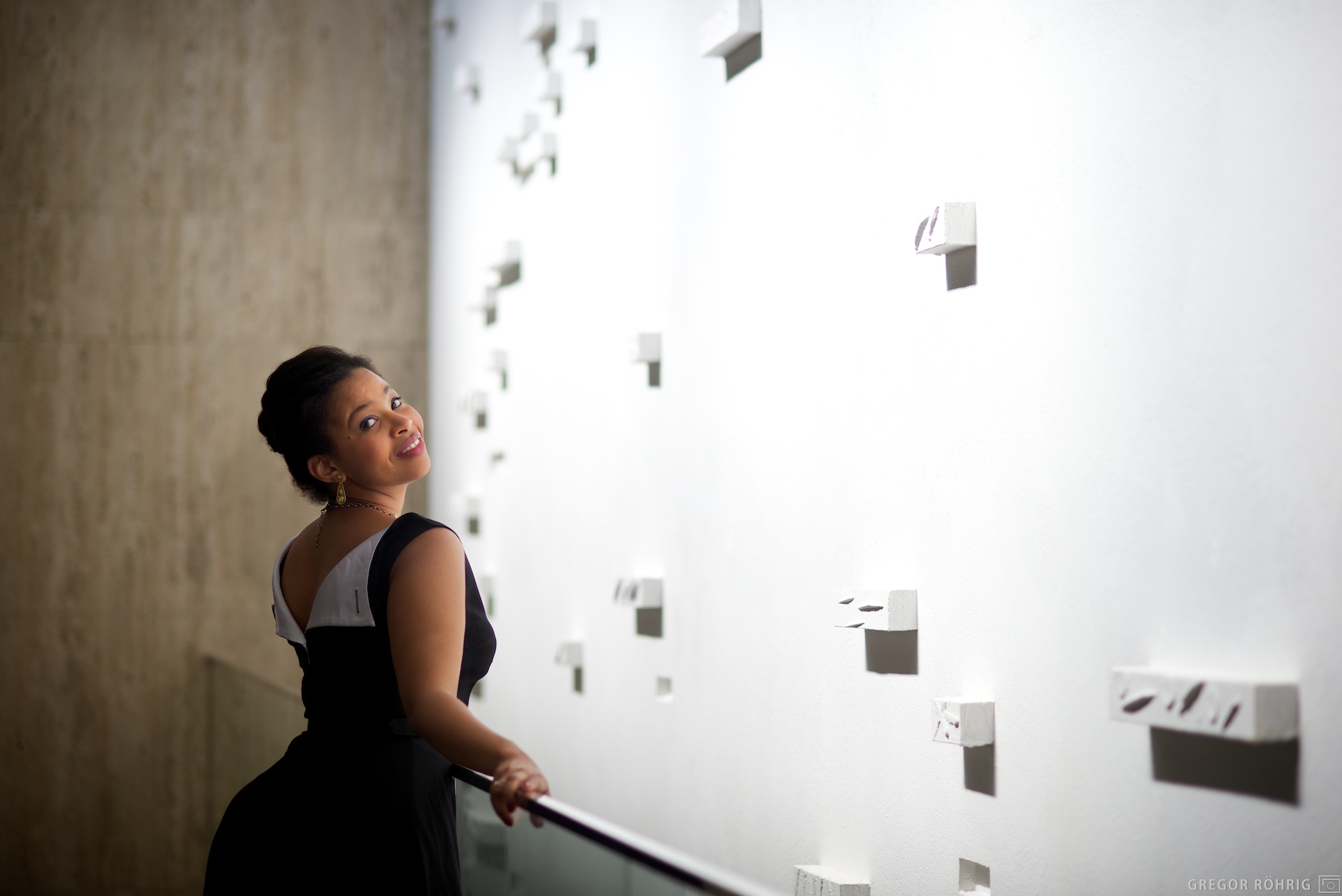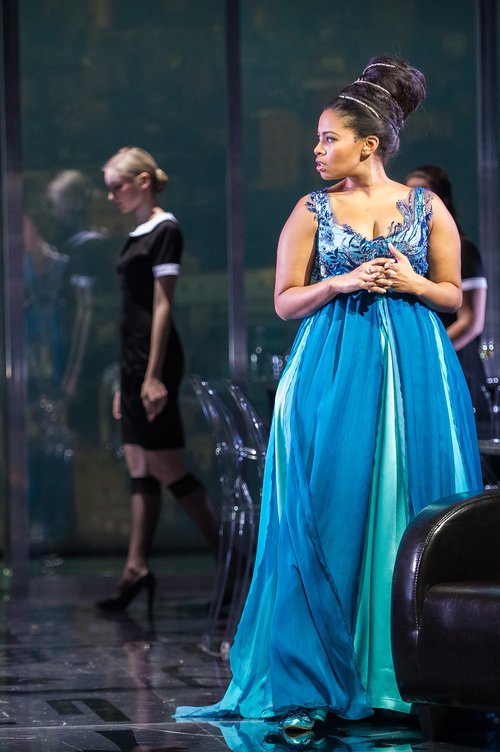Walls have been on my mind over the last few weeks and throughout the year. Their physical forms have made the news, in past and present iterations, with invisible counterparts revealing divisions within the worlds of culture, politics, and self. There is an odd, illusory comfort to them, the notions of order, permanence, stability they imply allowing for realizations of often staunchly-defended functionalities so delicate they may crack at the slightest hint of perceived disorder. One hates to admit wanting certain forms of them.
This winter I have naught to look at in my minuscule back garden but a high fence, erected at my request this summer. I’m still tossing around the merits of planting things around its wooden edges come springtime; I love (and painfully miss) the feel of soil on my hands and running through my fingers. Looking at a blank fence now brings memories of the cute, strange, unexpected buds that would poke through the old one that ran the perimeter of the immense garden behind the tiny house where I grew up. I remember looking out the kitchen window and being awed and perplexed by the unsymmetrical lattice patterns their insistent tendrils would make in the late afternoon sun, the greens, reds, and rust browns dancing in the shifting light. It made the fence oddly pretty, made spring seem somehow less distant.

Bud against a fence. Photo: mine. Please do not reproduce without express written permission.
Walls and their winding, decorative counterparts have always existed in the world of classical culture. Division and debate have occurred (and continue) on the stage, in the pit, in the boardroom, on the bus and the metro — in bars, parks, galleries, galleys, bedrooms. Though there is the strong (and not incorrect) belief that art is the ultimate dissolver of walls, such a divine theory often fails when put into human practise, our foibles making such manifestation a challenge, even in ideal circumstances. We, and the connections we form, are a dynamic part of creation: human thoughts, words, and actions place slats, tear them down, replace them, tear them down. The energy created from that creation-destruction cycle sharpens the intermeshing wires of existence (class, wealth, race, gender, geography, health, age), and colour the way we experience concerts, operas, each other. The dissolution of walls demands true openness, curiosity, risk… a hunger for authenticity, something one may speak about at length but which can only find true manifestation in life. In short: talk is cheap. In my conversation with Lera Auerbach at the Enescu Festival earlier this year, she underlined the importance of this quality and its relationship to art — as an experiential rite of passage, and broader life journey — more than once, making me think harder still about all the walls and fences both in and outside of music, and writing. What if authentic connection is the ultimate “wall” to be crossed? Is it possible, in art and in life?
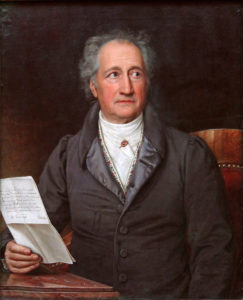
Goethe in 1828, by Joseph Karl Stieler
Famed German writer Goethe, whose work I referenced this past summer in relation to German composer George Katzer and his “Szene für Kammerensemble” (Scene for a Chamber Ensemble), tackled various types of walls throughout his wide range of poetry and novels. His works teem with characters who seek some way to live with authenticity – in spirit, in self, in practise. “Szene” takes this theme and goes further, using Goethe’s words to question, prod, and mock the then-contemporary East German regime under which it was created, satirizing its bureaucratic control of artistic exploration and expression. The chamber group ensemble unitedberlin, who performed “Szene” at the Konzerthaus Berlin in June as part of a larger program, was founded when the Berlin Wall fell in 1989. It was a richly resonant and very timely choice to feature Katzer’s work as part of the group’s thirtieth anniversary concert, not only because of Katzer’s own history, but because of the rising political and social tensions within Germany itself. They are wars in which Schubert would have, I suspect, recognized and understood.
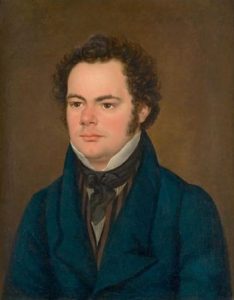
Portrait of Franz Schubert by Franz Eybl (1827)
I’ve been thinking a lot about his lieder lately, not least because of thinking back to a concert of Schubert lieder by soprano Golda Schultz in Berlin this past summer, as well as a recent conversation with baritone Gerald Finley in relation to a recent (gorgeous) recording he made of the composer’s Schwanengesang with pianist Julius Drake. To say the composer loved the work of Goethe is putting things mildly; Schubert set no less than eighty of Goethe’s poems to music, with at least a third of them written when he was still a teenager, between 1814 and 1815. As music writer Kenneth S. Whitton noted in his book Goethe and Schubert: The Unseen Bond (Amadeus Press, 1999), “The musicality of Goethe’s words unlocked Schubert’s unique voice, and continued to inspire Schubert for the rest of his life…”. The composer died in 1828, having never met his literary hero, but before that, he composed a song for a scene from Faust, “Gretchen am Spinnrade” (“Gretchen at the spinning wheel”), written when Schubert was seventeen. One of the most famous and beloved of Schubert’s lied, the work deals with some very real societal walls. The tale of the heroine’s seduction and subsequent abandonment by the titular anti-hero, followed by her trial and execution for the murder of her child, had a terrible resonance; stories of infanticide by desperate, socially-outcast unwed mothers (who dealt with very real walls of their own in the times in which they lived) were not uncommon in the poet and the composer’s day.
Setting such subject matter to song gave Goethe’s words — and its horrific reality — an especially disturbing resonance, one more fully realized in “Gretchen im Zwinger” (also known as “Gretchen’s Plea”). Music is not merely an echo of text here but experience, one that transcends the limitations — the walls, if you will — imposed by the verbal. This transcendence has real-life roots, however, giving these works an earthiness that roots them to lived human experience and suffering. One does feel the soil of the earth in his compositions, and rightly so.
Equally human are his Suleika works. Johannes Brahms once said of the first of its two parts (written in 1821) that it was “the loveliest song that has ever been written.” The lied are based on Goethe’s West-östlicher Divan (West–Eastern Divan), written between 1814 and 1819 (an expanded version appeared in 1827), with the Book Of Suleika being one of its twelve sections, and one of its lengthiest. Inspired by the work of Persian poet Hafez and greatly aided by translations of said work by historian Joseph von Hammer, West-östlicher Divan was the final major cycle of poetry Goethe wrote before his passing in 1832. Along with Schubert, other composers, including Schumann, Mendelssohn, Hugo Wolf, Richard Strauss, and Arnold Schoenberg, set verses from Suleika to music; there’s a musicality to the words that beg for sonic expression:
How your wings in gentle movement-
In my breast awaken longings —
Flowers, meadows, hills and forests —
Stand beneath teardrops of your soft breath.Yet your mild and balmy blowing
Cools my eyelids’ painful aching —
Oh, for sorrow I would die —
When I could not hope to see his face.Hurry, now to my beloved —
Speaking softly to his heart, (oh,)
Careful never to distress him —
Hiding from him all my torment.
As it turns out, The Book Of Suleika (which means “seductress” in Arabic) may have not been written by Goethe at all, so much as edited; there is suspicion (however contentious) that the actual writer could have been Austrian dancer and actress Marianne von Willemer. Married and thirty-five years the poet’s junior, von Willemer and Goethe engaged in a passionate correspondence when the poet was at his height of his fame, despite being married to Christiane Vulpius, regarded as his social and intellectual inferior – a woman with whom he knocked down walls himself, living scandalously unwed for eighteen years before marrying and having five children with her (only one survived). Vulpius suffered a series of serious health challenges (including a stroke) before her passing in 1816. We don’t know what she made of the predictably large galaxy of worshipful fangirls who threw themselves at her husband; it would seem Goethe himself was always “in love” (in a clichéd fashion) and cycled through numerous affairs (physicalized and not) before, during, and after his marriage, his writing ever expanding in incredible breadth and scope. As writer Adam Kirsch wrote in The New Yorker in 2016, “(f)or Goethe, love and learning and writing formed a continuous cycle, which didn’t cease until he was on his deathbed—and perhaps not even then. At the age of eighty-two, dying of a painful heart condition, Goethe’s last words were “More light!””
The dividing lines between artist and behaviour can sometimes be very hazy indeed, let alone its connection to the actual art being produced amidst such circumstances, but Suleika offers a meta-narrative (however inadvertent) in the form of a small if captivating bud poking through some rather tall fences, ones with slats labelled “genius,” “worship,” “art”, even up to our own time. It’s in such unexpected invasions one can find the truest sort of authenticity, or so I’d like to believe. In the notes for Hyperion’s immense Schubert: The Complete Songs box set, pianist and song specialist Graham Johnson writes:
Schubert had written nothing as openly impassioned as this for woman’s voice since the climax of ‘Gretchen am Spinnrade’; that work had been shot through with the anguish of betrayal, but here we hear only the rapture of reciprocation. True enough, it is the rapture of Marianne’s and Goethe’s fantasy of union, but who was better placed than Schubert to fantasize alongside them about the love which he could never enjoy in reality? […] Schubert has allowed the two lovers to conjoin where the disparity between their ages as well as geographical distance defeated them in real life.
After attending Schultz’s concert earlier this year, I remember looking down to see various markers on the Berlin sidewalks, plaques indicating where the Berlin Wall once stood. I’ve walked across and on them innumerable times, but something about that night — the sight of them, with the sound of Schubert still buzzing in ears and vibrating in heart, combined with my walled view now — renders them more poignant. Physical walls fall, others become more fortified.
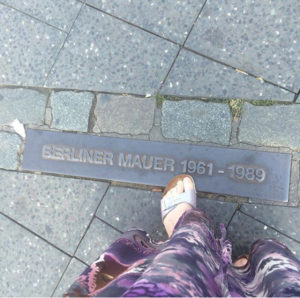
In Berlin. Photo: mine. Please do not reproduce without express written permission.
Maybe it’s good to look back – and while we’re at it, around, up, and down – at the ground, the pavement, the plastic, at the base of the posts we’ve so keenly laid slat after slat across. Is it a chaos we’re afraid of, or our own perceptions – us– being changed? Perhaps it’s time, to paraphrase Leonard Cohen, to find the cracks that let the green through, and time to be unafraid of feeling our hands in the warm soil once more. Nothing real grows otherwise.

